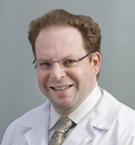-

JNF Medical Advisory Member, Dr. Joshua Hirsch named Top Doc
May 1, 2015 5:47 p.m.
Name: Joshua A. Hirsch
Hospital Affiliation: Massachusetts General Hospital
Title: Director of Interventional Neuroradiology, Co-Director of Neuroendovascular Program, Chief of NeuroInterventional Spine Service, Associate Professor at Harvard Medical School
Field: Interventional Radiology
Specialty: Interventional NeuroradiologyDid you always want to be a doctor? What led you to pursue medicine?
I decided to become a doctor when I was 11. I was in Israel with my father and saw some of the amazing work that surgeons were doing. I was impressed by the impact medicine could have on people’s lives.What has your journey been like to get to where you are today?
I went to the University of Pennsylvania for medical school. When I graduated, I was actually one of the youngest graduates since the 18th century. I completed both my residency and my first fellowship in Philadelphia and then came up to Boston and worked at the Lahey Hospital’s Neurovascular Center for my second fellowship in interventional neuroradiology. I worked at Beth Israel Deaconess Medical Center for a couple of years after that and then moved to Mass General in 2003 as the director of the neurovascular program. This has been a funny journey for me. I started as a young medical student and now, 24 years later, I feel like I am becoming an old man. But having embraced this field of interventional neuroradiology for so long and to think about where we are going in the future is still very exciting.How did you come to choose your specialty?
I was a young man in medical school and was impressed by the innovation in interventional neuroradiology and the opportunity to make a really fundamental impact in patient care. It really grabbed my attention and I knew pretty early on that this is what I wanted to do.How has the field changed since you started?
The techniques are getting more and more powerful. We are fundamentally image guided in our treatments which means we do not use a big opening like you would in surgery. Instead, we use a tiny opening and allow imaging to precisely guide us. So the fact that the imaging technology has advanced so much in such a short period of time allows us to care for conditions that were too difficult to treat before.Minimally invasive procedures seem to be a growing trend in medicine recently. Could you explain what their benefits are compared to those of their traditional counterparts?
When you are doing surgery, the bigger the incision, the longer you have to recover to be where you want to be. So the trend in a lot of different places in medicine is going toward minimally invasive procedures. The healing of the tissues is then much easier and the risks that you have are potentially less.For example, if someone is bleeding from an aneurysm in their brain, in the old days, we would have to open up the skull to the affected area and place a clip across the neck of the aneurysm like a staple. Now, we go from a little incision in the leg, up to the neck, from the neck into the brain, and very precisely deposit coils inside the aneurysm, filling it from the inside.
You have also published on topics such as socioeconomic issues and health policy. What led you to be so passionate about these issues?
I was, like many other doctors, just excited about the mechanics of what I do. The thing was, I kept hearing about these changes in health care and I felt that physicians were allowing themselves to become marginalized regarding how we ought to be delivering health care in the future. And what I found when I began to publish on this was that there was actually a real appetite from people for articles on those subjects.I have actually recorded a fairly substantial number of podcasts on a variety of medical topics and I am proud to say that the most downloaded podcast is on the Affordable Care Act. It is so gratifying to see that what used to be an esoteric interest of the community is now a part of the mainstream.
So I started learning about it out of an interest in bettering myself, but I realized that there is an opportunity to actually more broadly educate the medical community about issues that they ought to be centrally interested in.
What is on the horizon for you in the future?
To continue to strive these kinds of minimally invasive, image-guided therapies to a broader cadre of patients. What we didn’t even imagine was possible a decade ago is now not only possible but is now the standard of care. And when I think about the future, it is just fantastic to think about the cutting edge therapy that takes these hard diseases and makes them so treatable.CONGRATS DR. HIRSCH!!!
Posted on Sunday, May 10, 2015 -
Comments
